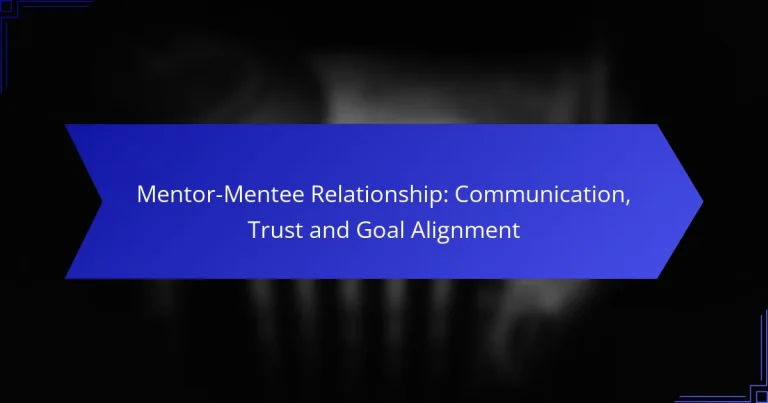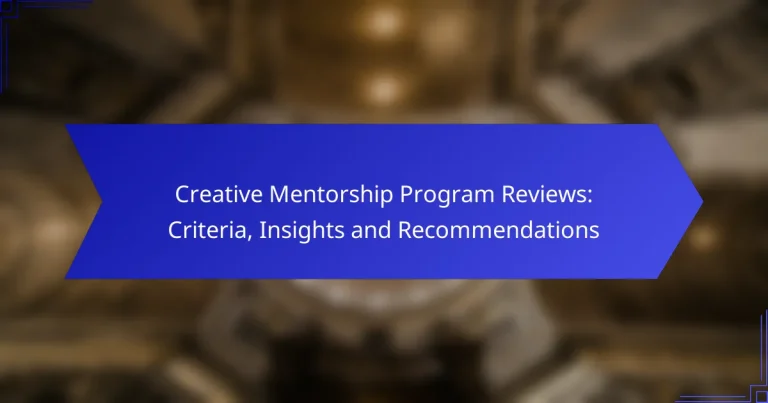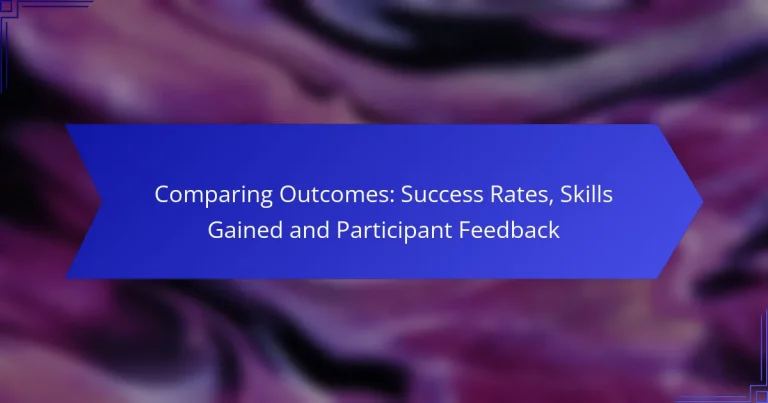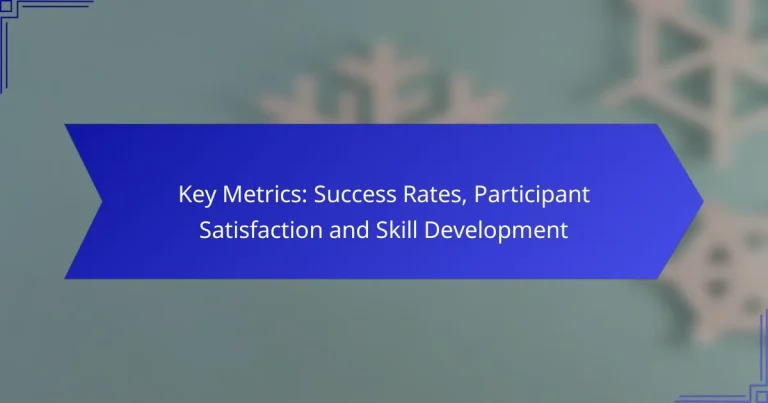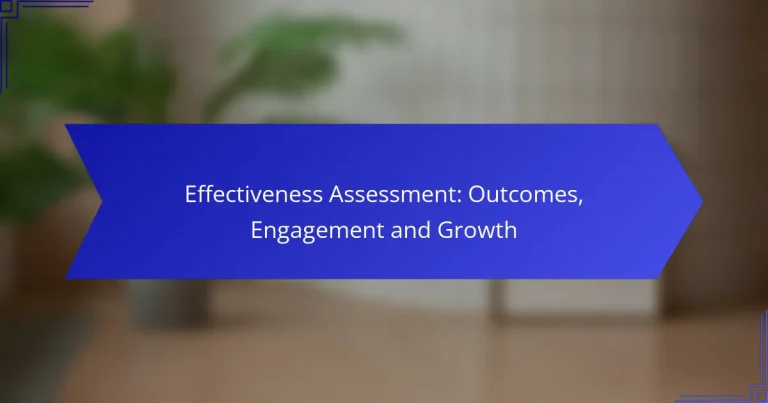What are the best creative mentorship programs in the US?
The best creative mentorship programs in the US provide valuable guidance, resources, and networking opportunities for emerging artists and creators. Programs like Creative Mornings, Adobe Creative Residency, and Young Arts stand out for their unique approaches and support structures.
Creative Mornings
Creative Mornings is a global breakfast lecture series that connects creative individuals through monthly events. Each event features a speaker who shares insights on various topics related to creativity, fostering community and collaboration among attendees.
Participants can benefit from networking opportunities and the chance to engage with local creative leaders. To get involved, check for events in your city and consider attending regularly to build connections and gain inspiration.
Adobe Creative Residency
The Adobe Creative Residency offers emerging creatives a year-long opportunity to work on personal projects while receiving mentorship from industry professionals. Residents receive a stipend, software, and resources to help them develop their skills and portfolios.
This program emphasizes the importance of community, encouraging residents to share their work and insights through various platforms. If you’re looking to apply, prepare a strong project proposal that showcases your vision and creativity.
Young Arts
Young Arts is a national program that identifies and supports talented young artists in various disciplines, including visual arts, music, and writing. Participants receive mentorship from established artists and have opportunities for scholarships and awards.
To apply, students typically need to submit a portfolio and demonstrate their artistic abilities. Engaging with this program can significantly enhance your artistic journey and open doors to further educational and professional opportunities.
How do I choose a creative mentorship program?
Choosing a creative mentorship program involves assessing your personal goals, the qualifications of potential mentors, and the format of the program itself. A well-suited program aligns with your aspirations and provides the right support structure to foster your creative growth.
Assess program goals
Start by identifying what you want to achieve through mentorship. Are you looking to enhance specific skills, gain industry insights, or expand your professional network? Programs often have distinct objectives, such as fostering innovation, improving technical skills, or preparing for career transitions.
Evaluate how well the program’s goals align with your personal aspirations. For instance, if your aim is to develop a portfolio, seek programs that emphasize project-based learning and hands-on experience. This alignment ensures that you gain the most from the mentorship experience.
Evaluate mentor qualifications
The qualifications of mentors can significantly impact the effectiveness of the program. Look for mentors with relevant experience in your field, a proven track record of success, and a style that resonates with you. Their background should ideally include both practical experience and a commitment to teaching.
Consider reaching out to past mentees to gain insights into the mentor’s approach and effectiveness. A good mentor not only shares knowledge but also inspires and motivates you to push your creative boundaries.
Consider program format
The format of a mentorship program can vary widely, including one-on-one sessions, group workshops, or online interactions. Determine which format suits your learning style best. For example, if you thrive in collaborative environments, a group setting might be more beneficial.
Additionally, assess the duration and frequency of meetings. Programs that offer regular check-ins, whether weekly or monthly, can provide consistent support and accountability. Be cautious of programs that lack structure, as they may not provide the guidance you need to achieve your goals.
What are the benefits of creative mentorship programs?
Creative mentorship programs offer numerous advantages, including enhanced skill development, expanded networking opportunities, and significant personal growth. These programs connect emerging talents with experienced professionals, fostering an environment for learning and collaboration.
Skill development
Creative mentorship programs are designed to enhance specific skills relevant to the mentee’s field. Participants can expect to receive tailored guidance that addresses their unique challenges and goals, whether in design, writing, or other creative disciplines.
For example, a graphic design mentee might work on real projects with their mentor, receiving feedback that sharpens their technical abilities and creative thinking. This hands-on experience can lead to a noticeable improvement in their portfolio and overall competence.
Networking opportunities
These programs often facilitate valuable connections within the industry. Mentors typically have extensive networks, allowing mentees to meet other professionals, attend events, and gain exposure to potential job opportunities.
Building relationships through mentorship can lead to collaborations, referrals, and insights into industry trends. Mentees should actively engage with their mentor’s network to maximize these opportunities.
Personal growth
Creative mentorship programs significantly contribute to personal growth by fostering confidence and resilience. Mentees often face challenges that push them out of their comfort zones, leading to increased self-awareness and adaptability.
Additionally, receiving constructive criticism and encouragement from a mentor can help individuals develop a growth mindset. This shift in perspective can be crucial for long-term success in creative fields, where innovation and adaptability are key.
What are the costs associated with creative mentorship programs?
Creative mentorship programs can involve various costs that participants should consider before enrolling. These expenses typically include tuition fees, material costs, and travel expenses, each of which can significantly impact the overall investment in the program.
Tuition fees
Tuition fees for creative mentorship programs can vary widely based on the institution and the program’s duration. Generally, fees can range from a few hundred to several thousand dollars, depending on the level of expertise and resources provided. It’s essential to compare different programs to find one that fits your budget while still offering quality mentorship.
Some programs may offer scholarships or financial aid, so it’s worth inquiring about these options to reduce your tuition burden. Additionally, consider the potential return on investment in terms of skills gained and career advancement opportunities.
Material costs
Material costs are another significant factor to consider when evaluating creative mentorship programs. Participants may need to purchase supplies such as art materials, software, or equipment specific to their field of study. These costs can range from modest amounts for basic supplies to substantial investments for specialized tools.
To manage these expenses, create a budget that outlines expected material costs and explore whether the program provides any included materials or resources. This can help you avoid unexpected financial strain during your mentorship experience.
Travel expenses
Travel expenses can add to the overall cost of participating in a creative mentorship program, especially if it requires attending in-person sessions or workshops. Costs may include transportation, accommodation, and meals, which can vary based on location and duration of the program.
When planning for travel, consider the proximity of the program to your home and whether virtual options are available. If travel is necessary, look for ways to minimize costs, such as booking in advance or sharing accommodations with fellow participants.
What criteria should I use to evaluate a creative mentorship program?
To evaluate a creative mentorship program, consider its structure, the success stories of past participants, and the overall impact on skill development. These criteria help determine the program’s effectiveness and alignment with your creative goals.
Program structure
The program structure should clearly outline the mentorship format, duration, and frequency of meetings. Look for programs that offer a mix of one-on-one sessions, group workshops, and practical projects to enhance learning experiences.
Additionally, consider the qualifications of the mentors involved. Experienced mentors with a proven track record in your area of interest can provide valuable insights and guidance. A well-defined curriculum that includes milestones can also help track progress.
Success stories
Reviewing success stories from previous participants can provide insight into the program’s effectiveness. Look for testimonials that highlight specific achievements, such as career advancements, portfolio improvements, or successful project completions.
Consider reaching out to alumni for firsthand accounts of their experiences. A strong network of successful past participants often indicates a program’s quality and can offer valuable connections in your creative field.
How do creative mentorship programs compare to traditional education?
Creative mentorship programs offer personalized guidance and real-world experience, contrasting with the structured curriculum of traditional education. While both approaches aim to develop skills, mentorship often emphasizes practical application and individual creativity over standardized learning.
Flexibility and Personalization
Creative mentorship programs provide a flexible learning environment tailored to individual needs. Unlike traditional education, which follows a set syllabus, mentorship allows for customized projects and feedback based on the mentee’s interests and goals.
This personalized approach can lead to deeper engagement and faster skill acquisition, as mentors can adapt their teaching methods to suit the learner’s pace and style. For instance, a graphic design mentee might focus on specific software tools that align with their career aspirations, rather than covering a broad range of topics in a classroom setting.
Networking Opportunities
Mentorship programs often facilitate valuable networking opportunities that traditional education may not provide. Mentees can connect with industry professionals, gaining insights and potential job leads that are crucial for career advancement.
For example, a mentee in a film mentorship program might attend industry events or workshops, allowing them to meet directors, producers, and other creatives. These connections can lead to internships or collaborative projects, enhancing the mentee’s portfolio and professional network.
Cost Considerations
Creative mentorship programs can vary significantly in cost compared to traditional education. While some mentorships are free or low-cost, others may charge fees that reflect the mentor’s expertise and the program’s resources.
In contrast, traditional education often involves substantial tuition fees, which can range from thousands to tens of thousands of dollars annually. Mentees should weigh the potential return on investment of mentorship against the costs of formal education, considering factors like job placement rates and industry demand.
Skill Development Focus
Creative mentorship programs typically emphasize practical skill development over theoretical knowledge. Mentors guide mentees through hands-on projects, allowing them to apply what they learn in real-world scenarios.
For example, a photography mentor might assign projects that require shooting, editing, and presenting work, rather than focusing solely on the history of photography. This experiential learning can better prepare mentees for the demands of the creative industry.
